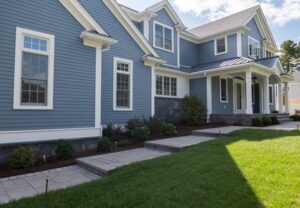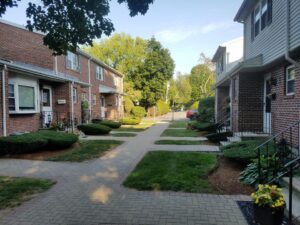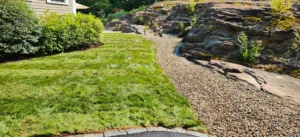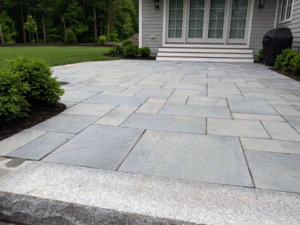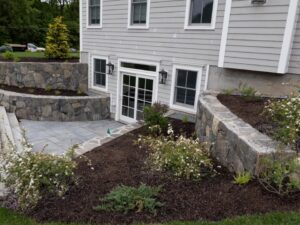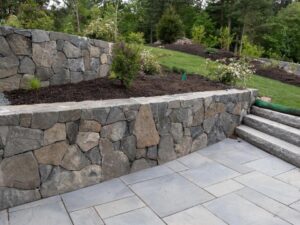Introduction: Why Stone Matters in Hardscaping
When it comes to hardscaping in Massachusetts, the type of stone you choose can make or break your outdoor design. The right stone not only enhances your property’s aesthetics but also withstands harsh New England weather.
From granite patios in Boston to bluestone walkways in Worcester, each stone type offers unique textures, colors, and levels of durability. Choosing wisely ensures that your investment lasts for decades — and looks stunning year-round.
Let’s explore the top 10 most popular stones used in hardscaping in Massachusetts, their best uses, and expert tips for selecting the perfect one for your property.
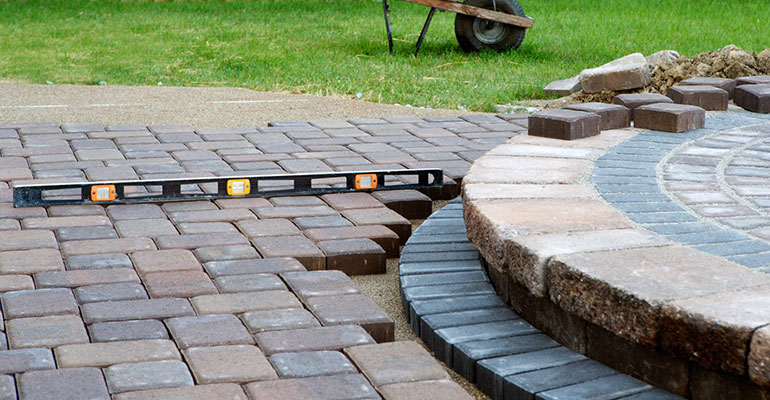
1. Granite: The Iconic New England Choice
Benefits of Granite in Hardscaping
- Extremely durable and weather-resistant
- Handles freeze-thaw cycles perfectly
- Adds natural beauty and sophistication
- Low maintenance
Best Uses for Granite
- Patios and walkways
- Retaining walls
- Outdoor kitchens and steps
Pro Tip: Choose locally sourced Massachusetts granite for authenticity and sustainability.
2. Bluestone: The Classic Northeast Favorite
Bluestone, known for its deep blue-gray hue, is a regional favorite that pairs beautifully with historic homes.
Pros and Cons of Bluestone
Pros:
- Non-slip surface — great for pool decks
- Elegant, timeless look
- Works well in both formal and rustic settings
Cons:
- Can fade with exposure to sunlight
- Slightly more porous than granite
Ideal Applications
- Patios
- Garden paths
- Pool surroundings
3. Fieldstone: Rustic and Natural Appeal
Nothing feels more “New England” than fieldstone — irregularly shaped stones found in local fields and farms.
Where Fieldstone Works Best
- Retaining walls
- Garden borders
- Fire pits and outdoor fireplaces
Style Note: Fieldstone delivers a rugged, natural look that blends beautifully with wooded Massachusetts landscapes.
4. Limestone: Elegant Yet Durable
Limestone offers smooth textures and light, warm tones perfect for more refined designs.
Limestone vs. Granite Comparison
| Feature | Limestone | Granite |
|---|---|---|
| Durability | Moderate | High |
| Cost | $$ | $$$ |
| Texture | Smooth | Grainy |
| Best For | Patios, garden walls | Steps, outdoor kitchens |
Pro Tip: Use sealed limestone to prevent moisture absorption during harsh Massachusetts winters.
5. Slate: Textured Beauty for Walkways
Slate’s natural cleft surface provides grip and elegance, making it ideal for walkways and garden paths.
Advantages of Using Slate
- Rich color variety (gray, green, purple)
- Slip-resistant texture
- Low maintenance when sealed
Tip: Avoid using thin slate in freeze-prone areas — thicker slabs perform better in New England’s cold.
6. Cobblestone: A Timeless New England Touch
Few materials define historic Massachusetts streets better than cobblestone. These rounded stones add character and endurance.
Why Cobblestone Is Perfect for Massachusetts Driveways
- Nearly indestructible
- Adds old-world charm
- Handles heavy vehicle traffic easily
Ideal Uses: Driveways, edging, and garden accents.
7. Sandstone: Warm and Versatile
Sandstone brings a soft, natural warmth to any yard, with colors ranging from tan to rust red.
How Sandstone Performs in Massachusetts Weather
- Handles moderate freeze cycles well
- May need periodic sealing to prevent moisture stains
- Adds warmth to modern hardscapes
Best For: Garden paths and patios with earthy tones.
8. Quartzite: Strength Meets Style
Quartzite is harder than granite and has a sparkling appearance that elevates any outdoor space.
Benefits of Quartzite Pavers
- Scratch and stain resistant
- Extremely durable
- Adds modern elegance
Pro Tip: Use quartzite for high-traffic zones like driveways and pool decks.
9. Marble: Luxury for Modern Landscapes
Marble isn’t just for interiors anymore — it’s being used in high-end outdoor designs too.
Is Marble Right for Outdoor Projects?
- Elegant and high-end aesthetic
- Needs sealing to handle snow and ice
- Best for decorative areas, not heavy-traffic zones
Great For: Outdoor kitchens, patios, or luxury garden features.
10. River Rock and Gravel: Functional and Decorative
River rock and gravel are perfect for drainage, edging, and low-maintenance landscaping.
Top Uses for River Rock in Hardscaping
- Driveway bases
- Dry creek beds
- Decorative garden ground cover
Tip: Mix sizes and colors for a natural, layered look.
Comparison Table: Best Stone Types by Function
| Function | Best Stone Type |
|---|---|
| Driveways | Cobblestone, Granite |
| Patios | Bluestone, Limestone, Slate |
| Retaining Walls | Fieldstone, Granite |
| Walkways | Slate, Bluestone |
| Pool Areas | Bluestone, Quartzite |
| Decorative Borders | River Rock, Sandstone |
Stone Selection Checklist for Massachusetts Homeowners
✅ Assess your yard’s drainage and slope
✅ Match stone color to your home’s architecture
✅ Choose stones that can handle freeze-thaw cycles
✅ Determine maintenance level (sealed vs. natural)
✅ Plan for budget and delivery costs
✅ Always request samples before purchasing in bulk
How to Choose the Perfect Stone for Your Yard
When selecting your hardscaping material, consider these three key factors:
1️⃣ Budget:
Granite and quartzite are premium, while sandstone and gravel are more affordable.
2️⃣ Maintenance:
Sealed stones like limestone require periodic care; granite and cobblestone are nearly maintenance-free.
3️⃣ Climate:
Massachusetts winters demand frost-resistant materials — avoid porous or thin stones that may crack.
Why Hire a Hardscaping Professional
Choosing the right stone is only half the job — proper installation ensures lasting beauty.
Benefits of Working with Green Leaves Landscape
- Over 20 years of experience in Massachusetts hardscaping
- Expert design and material recommendations
- Licensed and insured installation team
- Locally sourced materials for authenticity
📞 Ready to start your project?
Visit Green Leaves Landscape or Contact Us to schedule your consultation today!
FAQs: Stone Hardscaping in Massachusetts
1. What is the most durable stone for hardscaping in Massachusetts?
Granite and quartzite are the strongest options — they withstand snow, ice, and heavy use.
2. Which stones are best for patios?
Bluestone and limestone offer a perfect mix of beauty, texture, and slip resistance.
3. How often should I seal my hardscape stones?
Every 2–3 years, depending on exposure and weather.
4. Can I mix different stones in one project?
Absolutely — combining materials like fieldstone walls with bluestone paths creates visual contrast.
5. Are natural stones eco-friendly?
Yes, especially when locally sourced to reduce transportation impact.
6. Do I need a professional to install hardscaping stones?
For large projects, yes — expert installation prevents cracking, uneven settling, and drainage issues.
Conclusion and Call to Action
Hardscaping stones define your property’s character, durability, and long-term value. Whether you prefer granite’s strength, bluestone’s charm, or fieldstone’s rustic beauty, the key is choosing materials suited for Massachusetts weather.
Let the experts at Green Leaves Landscape help you design and install a timeless hardscape that fits your lifestyle and budget.
📞 Call today or visit:
👉 greenleaveslandscape.com
👉 Stone Hardscaping Services
👉 Contact Us

